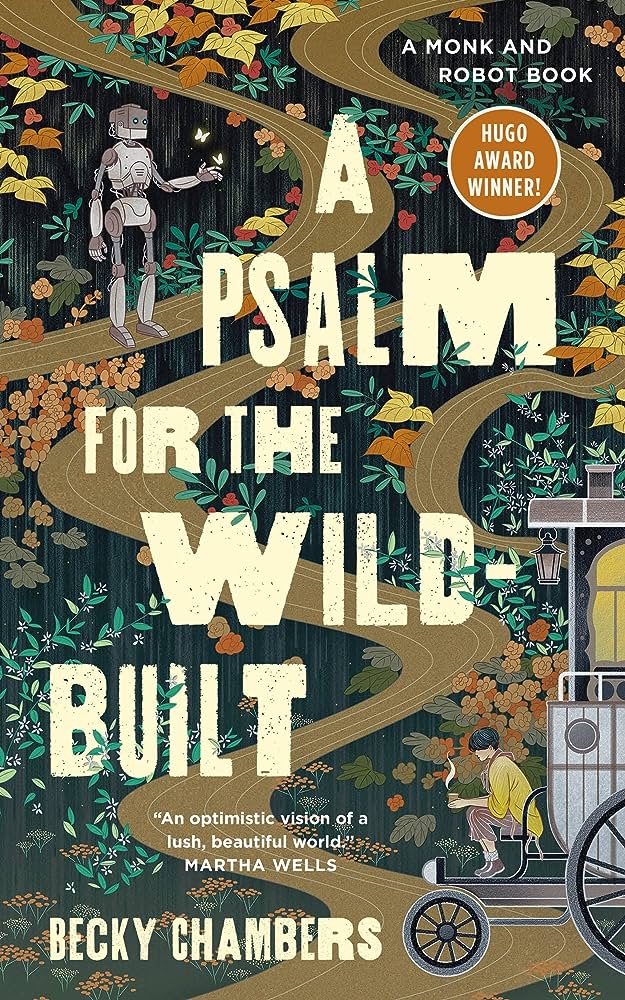That’s what the robots and machines of a moon called Panga said when they became self-aware and chose to remove themselves from human society. By agreement, humans and robots would have no further contact with one another until and unless the robots wanted it.
Centuries later, Dex (they/them) feels an itch for change, and starts a new life as a tea monk, serving custom herbal blends to customers who share their day-to-day struggles with them. Dex travels from town to town in their liveaboard pedal-powered caravan, providing a friendly ear and a brief respite from each customer’s worries.
This novella is the first in Chambers’ “Monk and Robot” series, so I don’t think it’s spoiling anything to say that Dex eventually encounters a robot, and the relationship that develops between them is what drives the plot. They are both seeking answers, and fate has brought them together.
I did enjoy this short book quite a lot, but I wished it was longer and provided more opportunities to understand the context of the robot awakening and what has happened on Panga in the years since. The world could be described as a kind of solarpunk utopia where, in the absence of machine power, humans have successfully navigated the transition to a sustainable, low-tech, human-powered society. That is possibly the least believable part of this story, or it at least invites many questions about how it all went down. Although they are living on a foreign moon, these are humans we’re talking about, and humans don’t just decide, en masse, to responsibly shift their entire society overnight. No, it would have been messy, with factions and politics and most likely bloodshed.
Another aspect of this book’s world that bears mentioning is the religious system. Panga is a pagan society with a pantheon of parent and child gods, each with its own perspective and sphere of spiritual influence. People naturally seem to become devotees of whichever god aligns with their own perspective, but it’s not exclusive, and people can and do connect to the entire pantheon. This is science fiction, not fantasy, so the gods are to be understood as philosophical archetypes and the book is therefore thankfully free from supernatural interventions. That said, for me to believe in a human society that is spiritually homogeneous requires some explication. And even if it is sufficiently explained, I will always be most interested in characters who chafe against that stricture, at least privately. I understand that this is a short novella with all the compromises that entails, but a nod to a diversity of belief and non-belief systems on Panga would have helped me find the world much more plausible.
I have read lots of far-future speculative fiction about post-scarcity civilizations, and I’m almost always willing to suspend my disbelief if the author provides enough backstory. Although A Psalm for the Wild-Built is in the same signature “cozy sci-fi” style as Chambers’ other books, I had believability concerns about this one that I did not have about the others. Maybe that’s simply because those were full-length novels and Chambers was able to provide more context, but now I’m wondering if it’s not because even the multiple-sentient-species, space-faring civilization of the Wayfarers series was naturally more believable to me than a society where everyone seemingly agrees on big topics like religion and mechanization.
To be clear, I’m not asking for all the details about the robot awakening or a deep dive into Pangan religious minorities. This is not that kind of book. But for me, it would have benefited from a few mentions of the chaotic transition to low-tech, or a nod to the persistent debate about appropriate use of technology, or maybe a paragraph about what life is like for Pangans with beliefs outside of the mainstream. Details like those would serve to make the book more believable because diversity of thought, dissent, and conflict are very normal parts of human society.
Perhaps those big-picture concerns are why I don’t read novellas very often, and short stories even less. I struggle to set aside all the questions I have and lose myself in the story. All that aside, I did still very much enjoy A Psalm for the Wild-Built. In this case, the up-close-and-personal lens that Becky Chambers employs so well was enough for me to set aside my quibbles and enjoy the unfolding relationship between Dex and their robot companion. I look forward to reading the second (and final?) novella in the Robot and Monk series, A Prayer for the Crown-Shy, as soon as I can get my hands on a copy.
